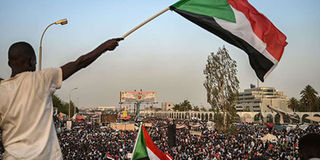Forgotten revolution worth reclaiming

A Sudanese protester waves the national flag during a rally outside the army complex in Sudan's capital Khartoum on April 18, 2019. PHOTO | AFP
What you need to know:
- There are emerging economic success stories in the US and Africa.
- African economies have grown by leaps and bounds, reaching a total GDP of $6.36 trillion in 2017.
In the Julian calendar, October is generally considered as a month of revolutions mainly because of two widely acclaimed moments: The Russian Bolshevik Revolution of 1917, which laid the foundation for socialism in Russia, and the Chinese Communist Revolution led by Chairman Mao Zedong, which proclaimed the People’s Republic of China on October 1, 1949.
But there is another historic October moment for Africans, which is given little or no attention by the public media — the 5th Pan-African Congress in Manchester, England, in 1945. The participants came armed with a singular, righteous purpose: Liberation from the yoke of colonialism, racism and apartheid.
CHINESE REVOLUTIONS
It’s absolutely essential for people of African descent to put a higher premium on the commemoration of the congress as it set in motion a process whose outcomes are no less revolutionary than the Russian and Chinese revolutions.
What sets out this congress from the previous four is that the former translated the Pan-African vision into a project for accelerated decolonisation of the continent. Hence the priority was political without negating the economic and spiritual emancipation, which were intrinsic to the original vision as articulated by W.E.B. Dubois.
This was largely achieved some 50 years later with the triumph against apartheid, signified by the election of Nelson Mandela as President of South Africa, which marked the end of an epoch defined by the partitioning of Africa at the Berlin conferences of 1884 and 1885.
The five-day congress was officially opened on October 15 at Charlton Town Hall, which was decorated with the flags of Ethiopia, Haiti and Liberia. The officials were Dubois and Peter Milliard, (co-chairs); George Padmore and Kwame Nkrumah (joint political secretaries); Jomo Kenyatta (assistant secretary); and Peter Abrahams (publicity secretary).
COLONIAL RULE
Other notables were Obafemi Awolowo, Hastings Kamuzu Banda and T.R. Makonnen.
The congress manifesto demanded an end to colonial rule and racial discrimination, carried forward the broad struggle against imperialism, and advocated human rights and equality of economic opportunity.
Delegates resolved to return to their countries to lead the decolonisation campaign. So determined and committed were they that within 12 years, Nkrumah led Gold Coast to independence as Ghana’s founding father.
Upon taking the oath of office, Nkrumah uttered the famous words: “The independence of Ghana will be meaningless unless it is linked with the total liberation of the continent of Africa.”
So successful was the struggle for independence that, in 1963, the Organisation of Africa Unity (precursor to the African Union) was founded in Addis Ababa, Ethiopia.
While in Manchester barely 20 years earlier, the conference hall sported only three flags (one being of a Caribbean country); in Addis, 31 were hoisted gracefully.
ECONOMIC SUCCESS
Seventy-four years since Manchester, time has come for a new epoch in which Africa must begin to make a critical focus on the economic and spiritual well-being of its people. There are emerging economic success stories in the US and Africa.
In spite of the fact that after being freed from slavery African-Americans had no more than the promise of 40 acres and a mule, today they have an aggregate income of more than $850 billion! That surpasses the average GDP of most African nations.
African economies have grown by leaps and bounds, reaching a total GDP of $6.36 trillion in 2017. But the continent could have done better had it not been for the legacy of neocolonialism and lack of good governance.
It’s time Africa crossed the boundaries of colonial memory and became an equal partner in the global scientific, social and cultural edifice.
That entails initiating an integrated vision in which leaders undertake concerted efforts and synergise their resources towards a major economic facelift of the continent by harnessing the economic and moral strengths both within the continent and the diaspora.
PAN AFRICAN CONGRESS
October 2020 is the 75th anniversary of the 5th Pan-African Congress. That would provide an opportunity to not only relive the political emancipation, but also push for a major thrust towards a new African economy by 2063, the centennial of the OAU.
Then, Africans would live beyond the vicissitudes of the past and invest their energy in reimagining Africa.
The biggest challenge lies in the dire need of insightful and courageous leadership such as demonstrated at the 5th Pan-African congress. Who will take the baton?
Rev Dr Kobia is a senior adviser on cohesion, peace and conflict resolution. [email protected]




